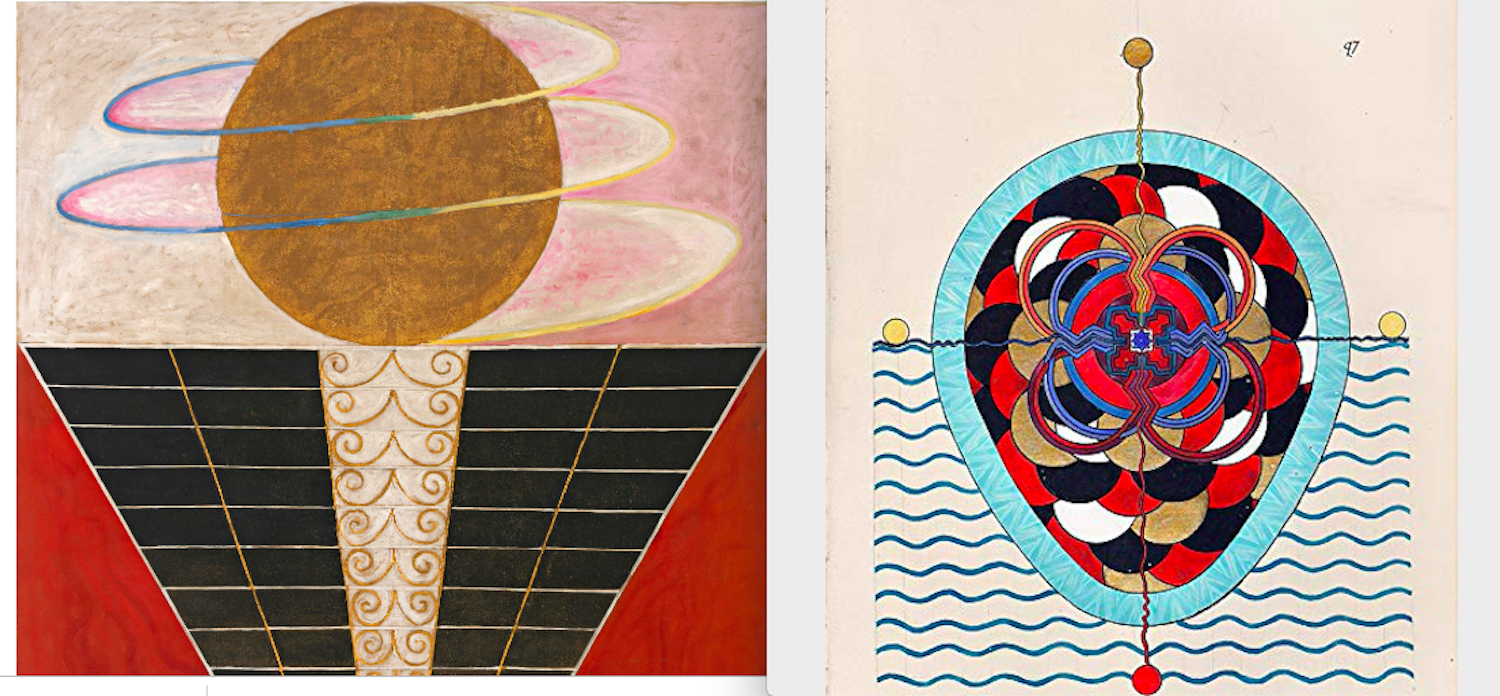A work by Hilma af Klint, and a work from Jung’s Red Book
In collaboration with Design Portland, to be held at Portland’s Lumber Room
In this conversation between Randy Higgins, Senior Environments Designer with The Felt Hat and Satya Doyle Byock, Director of the Salome Institute of Jungian Studies, we’ll take a deep dive into the practice of design through examining Carl Jung’s "Red Book" and Hilma af Klint’s "The Paintings for the Temple" from the early 20th century -- both intentionally left un-published in their lifetimes.
Now recently published, both works offer enhanced understanding of methods beyond patriarchy’s influence on contemporary design practice and process. They help answer the question "How can the Feminine be invited into design?"
This conversation will include audience engagement organically. Coffee, tea and light snacks will be offered as we believe the body and the soul should always be invited into the room...
Satya Doyle Byock & Randy Higgins
While the #metoo movement has punctuated the downfalls of patriarchy, there's more imbalance in the relationship between the masculine and feminine than just human resource issues. Satya Doyle Byock, Founder of The Salome Institute of Jungian Studies and Randy Higgins, Senior Designer of The Felt Hat invite attendees to join a larger community conversation about the way patriarchy has impacted design practices and how to return to a state of creative receptivity.
Using the recently published works of C.G. Jung’s Red Book and Hilma af Klint’s notebooks and paintings as a lens, visitors can expect a discourse around how to invite the feminine into a patriarchy-dominated space.
Tell us the story behind choosing these recently published texts for your Design Week Portland event.
This event is part of an ongoing conversation between the two of us around design and psychology. We each saw tremendous similarity between these two bodies of work—C.G. Jung’s Red Book and Hilma af Klint’s notebooks and paintings, all created at the beginning of the 20th century. We wanted to explore the similarities that lie behind their work, and what insights such work might offer us today, as creatives of all kinds. Both Jung and af Klint approached their art and creativity through listening: neither was guided by conscious goals for a specific outcome, but by a yin stance of receptivity, receiving, and creating what arose. This stance produced some of the most extraordinary work of the century, and it may hold the keys to tectonic shifts in our understanding, not just of creativity, but of culture.
What makes their content topical in today's design climate?
Both Jung’s Red Book and the works of af Klint address duality in the world from a perspective of gender—psychological or spiritual gender. They address what is out of balance and how to bring things back into balance.
Can you offer suggestions on how to invite the feminine in?
The process and product of Jung’s and af Klint’s great works provide clues to designers and creatives of all stripes: how can we listen to the muse versus impose ideas on our creative practice? How can we create an environment such that the muse wants to take up residence—to stay in perpetual dialogue and collaboration, versus arrive for our objectification, for us to use Her and then discard Her when we achieve the finished product that we sought?
While we have deadlines to meet and clients to please, the question of listening to the inner life as a guide in this process is of critical value—an area under-explored in our conversations.
The feminine honors process over product, the journey over the arrival, and the dialogue over the mandate. We’d like to explore in-depth how to bring these values more fully into our work as designers—as creatives working daily to bring new ideas and images into the world. How can these ideas and images be more deeply influenced by feminine process and inspiration from the beginning?


